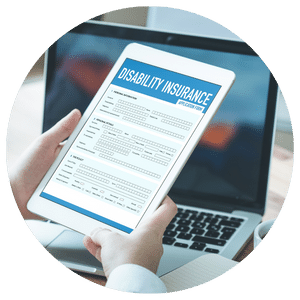


September 27, 2023
Disability insurance is a crucial financial safety net that can provide much-needed protection in the face of unexpected challenges. This type of insurance offers a lifeline to individuals who find themselves unable to work due to a disability, ensuring that they can maintain their financial stability and support their families during difficult times. As you contemplate whether disability insurance is worth the investment, let's explore some essential factors to consider.
In the intricate web of financial planning, few aspects are as fundamental as the preservation of your income. It serves as the cornerstone of your lifestyle, providing for necessities, aspirations, and the well-being of your loved ones. However, life has an uncanny way of throwing curveballs, and the possibility of a disability disrupting your income stream is a reality that deserves careful consideration.
serves as the cornerstone of your lifestyle, providing for necessities, aspirations, and the well-being of your loved ones. However, life has an uncanny way of throwing curveballs, and the possibility of a disability disrupting your income stream is a reality that deserves careful consideration.
Enter disability insurance—a powerful tool designed to offer a lifeline in times of uncertainty. Imagine the scenario: an unforeseen injury or illness renders you unable to perform your job. The once-familiar routine of waking up early, commuting to work, and contributing your skills is abruptly replaced by a new reality of medical appointments, treatments, and the pressing question of how to cover your financial obligations.
This is where disability insurance steps in as a financial fortress. In the event that you find yourself unable to work due to a disability, disability insurance ensures that you don't have to navigate the turbulent waters of financial insecurity alone. Instead, you can rely on a consistent source of income to maintain your standard of living, pay bills, and provide for your family's needs.
In the realm of employee benefits, disability insurance is often presented as a valuable perk offered by many forward-thinking employers. While this inclusion is undoubtedly advantageous, it's crucial to delve deeper into the details to ensure that the coverage provided adequately protects you and your family should the unexpected occur.
Employer-provided disability insurance can serve as an initial layer of protection, a safety net that offers a degree of financial support in case of disability-related income loss. This type of coverage is often a testament to your employer's commitment to your well-being, recognizing that unforeseen health challenges can impact any of their valued employees.
However, it's important to remember that these policies might come with limitations. When assessing the value of employer-provided disability insurance, consider the following factors:
Coverage Limits: The coverage offered by your employer might have limitations on the amount of income it replaces. It's essential to evaluate whether this coverage aligns with your financial needs, especially if you have significant financial obligations such as mortgage payments, education expenses, and healthcare costs.
Benefit Duration: Some employer-provided policies may have a limited benefit period, meaning they might only cover you for a specific timeframe. Depending on the nature of your disability, this duration might not be sufficient to support your long-term financial needs.
Occupation-Specific Terms: Depending on your job and the nature of the disability, employer-provided policies might include definitions of disability that are specific to your occupation. This could impact your eligibility for benefits if you're unable to perform the tasks associated with your job but could work in a different capacity.
Portability: What happens if you switch jobs? Employer-provided disability coverage might not be portable, meaning you could lose the coverage if you change employers.
Supplemental Needs: If your employer's policy leaves gaps in coverage or doesn't align with your financial goals, you might need supplemental coverage to ensure comprehensive protection.
In essence, while employer-provided disability insurance is a commendable gesture, it might not cover all the bases. Supplemental coverage is often necessary to bridge potential gaps and provide more comprehensive protection. The decision to invest in additional coverage depends on factors such as your financial obligations, family dynamics, and your own assessment of risk tolerance.
Here's where engaging a financial advisor becomes pivotal. A seasoned advisor can assess your unique situation, analyze your existing employer-provided coverage, and recommend a tailored approach that ensures you're adequately protected.
Undoubtedly, the cost of disability insurance is a significant consideration. Premiums can vary based on factors such as your occupation, health status, and the level of coverage you choose. While the expense might seem daunting, it's essential to weigh it against the potential financial strain of a disability. The peace of mind and financial security disability insurance offers can far outweigh the upfront cost, making it a prudent investment for your future.
 The world of disability insurance is diverse, with policies varying in coverage options. Key elements to evaluate include the definition of disability, waiting periods before benefits kick in, and the duration of coverage. Understanding these details is crucial to ensure you grasp what is covered and how benefits are calculated.
The world of disability insurance is diverse, with policies varying in coverage options. Key elements to evaluate include the definition of disability, waiting periods before benefits kick in, and the duration of coverage. Understanding these details is crucial to ensure you grasp what is covered and how benefits are calculated.
In the intricate tapestry of disability insurance, each coverage option serves as a thread, contributing to the overall strength and suitability of your policy. As you explore these options, remember that there's no one-size-fits-all solution. Your financial circumstances, risk profile, and future aspirations are unique, necessitating a policy that's tailor-made to address your needs.
This is where the expertise of a financial advisor shines. An experienced advisor can analyze your situation, help you understand the intricacies of different coverage options, and guide you toward the choices that align best with your objectives.
In the realm of financial decision-making, few resources are as valuable and indispensable as the guidance of a seasoned and knowledgeable advisor. When considering disability insurance, it's important to work with a financial advisor who can help you understand your options and determine whether it aligns with your financial goals and needs.
At Heritage Financial Planning, we understand the importance of protecting your income and
financial well-being. Our team can help you navigate the complex world of disability insurance
and find the coverage that is right for you. Contact us today to learn more about how we can
help you achieve your financial goals.
Disclosure: HFP is strictly a fee-only financial planning and investment management firm. HFP does not receive commissions for purchasing or selling annuities, insurance, stocks, bonds, mutual funds, limited partnerships, or other commissioned products. The Firm is not affiliated with entities that sell financial products or securities. No commissions in any form are accepted. No finder’s fees are accepted.
Written By: Heritage Financial Planning Team

Experiencing a job layoff can be a challenging and uncertain time, but with the right strategies and expert guidance, navigating a layoff isn't impossible. When you work with financial planning...
Read More
Life is full of uncertainties, and it is always challenging to determine if you are protected for the future. Macroeconomic conditions, family dynamics, financial goals, and succession planning are...
Read More
In the world of financial planning, there is a fundamental principle that sets certain advisors apart – fiduciary duty. This concept carries massive significance as you seek expert guidance to...
Read More
10440 N Central Expressway
Suite 1540
Dallas, TX 75231
214-446-2100
Site Links